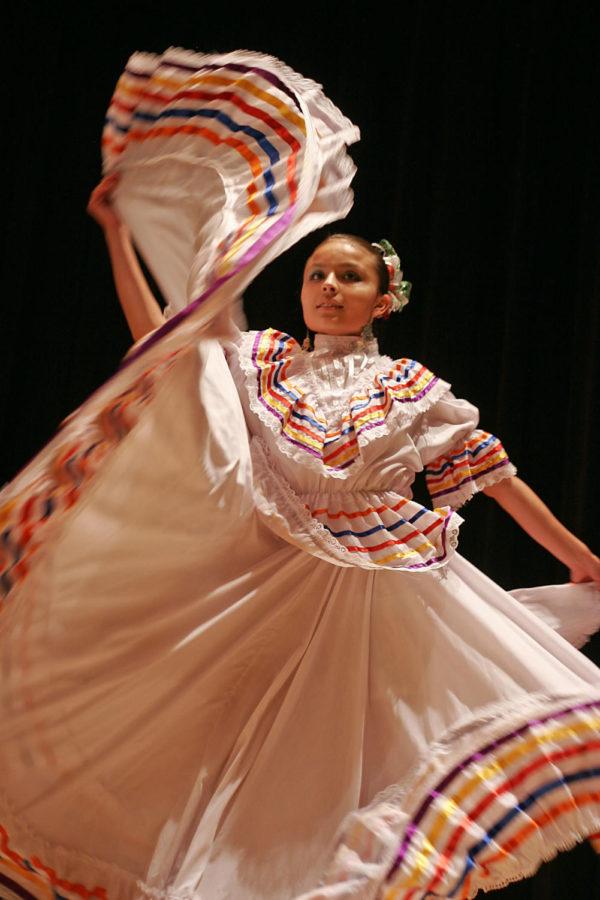Letter: Spanish and English can be equal parts of heritage
Photo: Eloisa Perez-Lozano/Iowa
Abi Contreras, of the Young Ambassadors, waves her skirt during a traditional Mexican dance at the Latino Noche de Cultura on Saturday, Oct. 15, in the Great Hall of the Memorial Union. In addition to Contreras, the Young Ambassadors is comprised of her two brothers, Moises and Abraham.
October 25, 2011
A Facebook post from NPR’s “Morning Edition” asked people what their life experiences had been regarding the use of Spanish, English and Spanglish. Anyone could answer, and they did. The following is reflection of my own experience with using Spanish and English as a Mexican-American in the United States.
Growing up in the United States, I grew up learning English as the main language of communication because I used it pretty much everywhere I went. Since I use it as often as I do, it’s understandable that I am fluent in it. In addition to English, I am also fluent in Spanish, making me fully bilingual. I believe this duality has greatly contributed to my development as an individual.
Spanish is the language of my family, and even though I was born in the United States, I still identify myself as a Latina. As a child, my mother had the rule that we were only allowed to speak Spanish at home so we wouldn’t lose that integral part of our culture since we spoke English everywhere else. Then she spent two or three summers teaching us how to read and write in Spanish. I will forever be grateful to her for that because not only has it helped me professionally, but more importantly, it has remained the core part of who I am as a person.
Many people say, “If you come to America, then you speak English,” and then support it by saying that their ancestors had to learn to speak English so today’s Latino immigrants shouldn’t speak Spanish. But America includes Canada, the United States, Mexico, and Central and South America so the more accurate term would be “United States.” Second, just because a person should learn the most used language of communication, English in this case, it does not mean the Spanish should have to disappear.
I understand that in eras past and recent, first-generation immigrants did not want to stand out for fear of persecution and discrimination. A way to blend in was to learn English and encourage your children to speak only English so they wouldn’t have an accent and therefore wouldn’t suffer the stigma of being different. While I understand this way of thinking, I think it is a shame that later generations eventually lost the Spanish language. I find it disheartening when I meet people who are culturally Latino, but do not speak Spanish. I feel they have missed out on an enriching and totally different dimension of life.
This does not mean, however, that I think people shouldn’t learn English. I believe they should at least make an effort to do it if it’s within their means, just like I would try and make an effort to learn the basics of the language of a place I would be going to visit or live. What I’m saying is that the Spanish does not need to be lost in the process.
People speaking Spanish around non-Spanish speakers is another issue that has sparked discussion. My question is what does it matter what language they speak in if they aren’t talking directly to you? Why do people assume others are talking about them if they are speaking in a different language? I’m going to tell you that nine out of 10 times, that’s probably not the case. If I am talking with anyone in my family, I will speak in Spanish regardless of who is around me. Even though we are all bilingual, it has nothing to do with whether we know English or not. Spanish is our language and it is how we relate to each other as a family. It is who we are.
If I have to interrupt that interaction and speak in English to someone else like a cashier at a supermarket, I will do so in order not to be rude to the person who is directly helping me. But I will not feel embarrassed for speaking in Spanish to my mother on my phone just because the people around me can’t understand what I’m saying. Why should I change my way of communicating with my mother because others who aren’t in the conversation don’t understand what I’m saying? It’s called freedom of speech, and it applies to any language as far as I’m concerned. My Spanish and English languages are equal parts of who I am, and I shouldn’t have to feel ashamed of either for anyone. Period.







